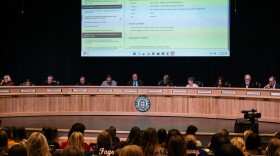Consider these recent steps by President Biden and his team: selling nuclear submarines to Australia, outlining their approach to trade with China and hosting a White House gathering with key U.S. partners in Asia.
"These were big moves on the chessboard in Asia," said Mike Green, an Asia specialist at the Center for Strategic and International Studies. "What they show you is that the effort to engage China isn't working the way everyone expected, and a recognition there has to be a lot more muscle in how we deal with China."
A decade ago, President Barack Obama spoke to Australia's Parliament and spelled out his vision of the U.S. role in Asia.
"Our enduring interests in the region demand our enduring presence in the region. The United States is a Pacific power, and we are here to stay," Obama said. "So let there be no doubt: In the Asia-Pacific in the 21st century, the United States of America is all in."
This declaration soon became known as the U.S. "pivot to Asia." It's an expansive idea, directed largely at China, that has been playing out it fits and starts ever since. Broadly speaking, three separate elements need to come together as a coherent strategy: a security plan, an economic blueprint and a diplomatic road map.
Biden is starting to give the pivot his own definition. He has portrayed the U.S. military withdrawal from Afghanistan as a big step away from the U.S. wars of the past two decades, while the submarine deal with Australia reflects security concerns of the future.
Trade friction with China still runs high
But the pivot needs more than just security arrangements aimed at China, says Roy Kamphausen, president of the National Bureau of Asian Research, a nonpartisan group.
"Your strategy cannot just be a military strategy," said Kamphausen. "Our partners and allies, while gratified that the United States is demonstrating its continued commitment in the security sphere, they also want to know what our economic plans are."
The Biden administration addressed the economic question this week. In her first major speech, Trade Representative Katherine Tai said the U.S. seeks to reduce trade tensions with China, but it will keep in place most of the tariffs imposed by former President Donald Trump.
"Our objective is not to inflame trade tensions with China, but above all else, we must defend, to the hilt, our economic interests," she said.
To counter China, the U.S. could now seek inclusion in the big trans-Pacific trade deal that the Obama administration negotiated — but that Trump rejected.
Yet both Republicans and Democrats are suspicious of trade deals for their own reasons. So better trade relations with China — or even with U.S. partners in Asia — is seen as a tough slog.
Some Asian nations appear ready to strengthen U.S. ties
Diplomacy in Asia may be more promising.
China's aggressive rhetoric, known as "wolf warrior diplomacy," has made some Asian nations wary of China and open to closer ties with the United States.
"Wolf warrior diplomacy and their bullying of other countries has kind of concentrated minds in parts of Asia to say, 'Wow, we have to meet this challenge together,' " said Anja Manuel, director of the Aspen Strategy Group and author of This Brave New World: India, China, and the United States.
India, for example, has always prized its independence on the international stage. But after bloody border skirmishes with China last year, India's prime minister, Narendra Modi, is more open to working with the United States.
"Those incursions across the Himalayan border, this long land border that China and India share, was really eye-opening to the Indians," said Manuel.
Modi attended a high-profile White House meeting last month with Biden and the leaders of Japan and Australia. The four leaders' countries make up the grouping known as the Quad.
"I think the Quad is an effort to say to China, 'Hey, we're willing to let you rise peacefully, but you've overstepped,' " Manuel added.
Biden adviser Kurt Campbell plays key role
A decade ago, Kurt Campbell was a top State Department official for Asia who helped his boss, Secretary of State Hillary Clinton, draft an article in Foreign Policy that raised the idea of a U.S. turn to Asia. Obama then delivered his speech outlining the proposal a month later in Australia.
Campbell offered his vision in detail in his 2016 book, The Pivot: The Future of American Statecraft in Asia.
Today, Campbell is Biden's top Asia adviser on the National Security Council.
"This is the first time we've had a person of that seniority, with that number of assets, on the National Security Council staff," said Kamphausen, of the National Bureau of Asian Research. "My impression is that this is really well thought out and there's more to come."
Green, the CSIS analyst, who worked on the National Security Council under President George W. Bush, says Biden appears committed to establishing a stronger U.S. presence in Asia.
"One of the scarcest things in American strategy is the president's time," said Green. "I worked in the White House almost five years, and I can tell you it's a significant thing that Joe Biden is putting so much of his time into building up our alliances to deal with China."
Still, there's no guarantee this will play out as the Biden administration hopes.
Asia expert Kamphausen says the challenge is for the U.S. and its partners to find ways to cooperate with China on some issues, compete on others and avoid direct confrontation.
"So we have to do it nimbly. How do you resist without provoking confrontation?" said Kamphausen. "It's going to be hard work, but we have to do it. Otherwise, any rhetorical aspirations to fully pivot to Asia really wouldn't come to pass."
Greg Myre is an NPR national security correspondent. Follow him on Twitter: @gregmyre1.
Copyright 2023 NPR. To see more, visit https://www.npr.org. 9(MDAzMjM2NDYzMDEyMzc1Njk5NjAxNzY3OQ001))







